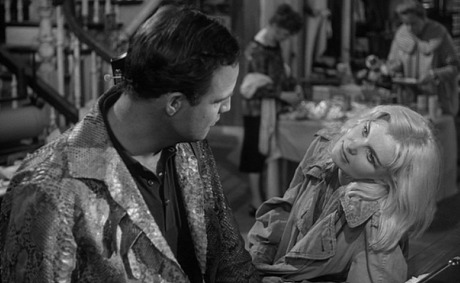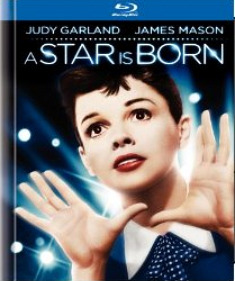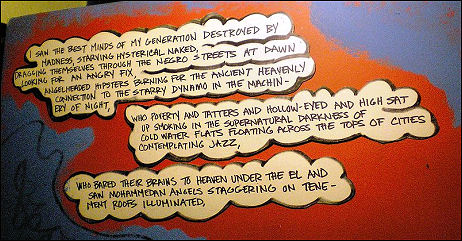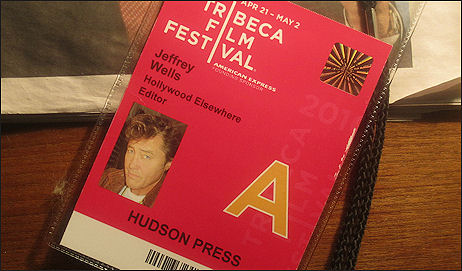Chris Hansen has an exemplary record of investigative inquiries (terrorist groups and Al-Qeada ops, airport security, Columbine, Oklahoma City terrorist attack, Unabomber, TWA Flight 800 disaster, Indian child slave labor, etc.), and yet his eternal, indelible identity will always be that of a mild-mannered buster of child predators, explaining the facts to perverts in kitchens and foyers as the cops gather outside, etc.
Daily
Hornet Bumped
Variety‘s Tatiana Siegel and Andrew Stewart are reporting that Michel Gondry‘s The Green Hornet is not only “going 3D” but being bumped from 12.22.10 to 1.14.11 — “the slower Martin Luther King weekend.”
“The studio bristled at the notion that bad buzz surrounding the project played a role in its decision to abandon one of choicest days on the box office calendar,” they’ve written. “Instead, Sony said that once the decision was made to incorporate 3D during the production process, Green Hornet needed to find a frame with sufficient digital screens.”
Here’s what my guy says: “Sony is not merely converting The Green Hornet into 3-D, but rewriting and reshooting sizable chunks of the movie. The action sequences don’t cut together and [are saddled with comprehension issues]. This isn’t a conversion — it’s an overhaul using 3-D as a smokescreen.”
Not Right or Fair
Why can’t the people who assemble these Hitler parodies (even this one) submit their copy to spell-check before posting? An apostrophe is idiotic when pluralizing “DVD.” Any twelve year-old kid can tell you that. “Helped improved awareness…”?
Fugitive Arrives
The Criterion DVD of Sidney Lumet‘s The Fugitive Kind arrives on 4.27. DVD Beaver‘s Gary Tooze says “the image looks good although not always stellar. I suspect it is as strong as the source elements will allow and probably what held it back from going Blu-ray.”

Marlon Brando, Joanne Woodward in Sidney Lumet’s The Fugitive Kind, coming to Criterion DVD on 4.27.
I would written something myself but a screener never arrived, despite my having received them from Criterion’s NY rep over the last couple of years.
“Criterion’s first disc shares the feature film with nothing else — not even a trailer — so the bitrate for the 2-hour film is very high,” Tooze reports. “It looks somewhat lighter and the softness appears to be inherent. The audio is mono — unremarkable but clean and clear. Criterion offer optional English subtitles.
“The new DVD is stacked with a second, dual-layered, disc starting with a 1/2 hour video interview with Lumet recorded for Criterion in 2010. He talks with passion and understanding about his career, the actors and especially Tennessee Williams. There is another half-hour piece entitled Hollywood’s Tennessee and The Fugitive Kind with R. Barton Palmer and Robert Bray supplying rich information about the lauded playwright.
“We also get three 20-minute one-act plays by Tennessee Williams from 1958, directed by Lumet and starring the likes of Ben Gazarra and Lee Grant, among others. Video quality is kinescope style and expectantly poor. Lastly, there is a 20-page liner notes booklet featuring photos and an essay by film critic David Thomson.”
Presumably Radiant Star
The TCM Classic Movie Film Festival begins tonight in Hollywood with a screening of a restored, mostly complete version of George Cukor‘s A Star Is Born. This is the 176-minute version of the Judy Garland-James Mason drama-with-music (as opposed to an actual “musical”) that Ron Haver assembled in 1983, and digitally restored to a fare-thee-well. Warner Home Video will release a Blu-ray version on 6.22.10.

The original length of Cukor’s film, seen at an early preview screening in Huntington Park, California on 8.8.54, was 196 minutes. A day after a second preview two scenes totalling 15 minutes were deleted, resulting in a version running 181 minutes. The general release version was trimmed further to 154 minutes. Haver’s semi-restoration was basically the 181-minute version minus five minutes of footage (substituted for with a montage of black-and-white stills) for a running time of 176 minutes.
Please note that the Amazon page for the forthcoming Star Is Born Blu-ray is incorrect in two ways: (a) it says that the running time is 154 minutes instead of the actual 176 minutes, and (b) it says the aspect ratio of the film is 1.77 to 1 despite the film having been shot and presented in the ultra-wide 2.55 to 1 CinemaScope process.
L.A. Times reporter Susan King ran a piece today about the TCM Festival, and spoke to WB senior vp George Feltenstein about A Star Is Born.
“What Ron Haver did was basically to reconstruct the film to the best of his ability,” Feltenstein tells King. “But at that time there wasn’t a digital restoration of the film itself.’

“Because of the flaws with early CinemaScope lenses, the original negative had jumps at the end of every splice. And the movie was turning red because the yellow layer of the Eastman color stock was fading.
“Because Warner is releasing the film on Blu-ray in June, it was imperative that the film be restored. ‘It has taken over 2 and 1/2 years,’ Feltenstein says. ‘You are dealing with a very long film and an enormously complex piece of film.'”
Can I say one thing that no one ever seems to bring up? Judy Garland was born in June 1922, and was between 31 and 32 years old when she made A Star Is Born. That’s fairly young in my book, but she looks closer to 40 in the film, certainly by today’s standards. She certainly doesn’t look like a young actress-singer just starting out, which is what Esther Blodgett is supposed to be. She looks stressed, worn down and plain with a too-short haircut and her chin starting to disappear — there’s a straight line between the tip of her chin and the base of her neck. Garland had lived a tough life up that point, and it didn’t get any more peaceful. She died in 1969 at age 47 — barely into middle age.
Hooray for Howl
Three months after Rob Epstein and Jeffrey Friedman‘s Howl screened at the 2010 Sundance Film Festival, a distribution deal has finally happened. Oscilloscope will release this absorbing semi-documentary in theaters and VOD on 9.24.10. Howl is quite an original thing — an instructive education as to the meaning of Allen Ginsberg‘s legendary poem. I was really glad I saw it. Why did it take so long to cut a deal?

On 1.21 I called it “an indie, artsy, half-animated dream-cream movie that’s basically an instructional primer for the uninitiated about what a wonderfully seminal and influential work Howl was and is.
“It’s brisk, condensed, in some ways florid, engaging, intellectually alert and stimulating. You know what this thing is? It’s a gay Richard Linklater movie, only deeper and more trippy. It’s an half-animated exploration thing that contains scenes of actors reading and ‘being,’ but in no way is this a movie that plays like a movie. It’s something else, and that’s a good thing for me.
“Howl is a ‘small’ film, but it’s rather wonderful and joyful in the particulars.
“Howl is not a narrative feature — it’s a near-documentary that says ‘stop what you’re doing and consider what a cool poem Howl was…in fact, let us take you through the whole thing and show and tell you how cool and illuminating it is.’ It uses Waltz With Bashir-like animation to illuminate what Howl was in Ginsberg’s head when he wrote it, and what the poem’s more sensitive readers might have seen in their heads when they first read it.
“James Franco ‘plays’ Ginsberg quite fully, particularly and well — he gets the slurring speech patterns and pours a mean cup of tea as he’s explaining a point to a journalist — but Franco, good as he is, is subordinate to (or should I say in harmony with?) the basic ambition of the film, which is to inform, instruct, awaken, turn on.
“For me, Ian McKellen‘s ‘Acting Shakespeare’ was a somewhat similar experience — an accomplished British actor explaining and double-defining the joy and transcendent pleasure of performing, feeling and really knowing deep down what Shakespeare’s poetry really means, and has meant to him all his life.
“I’ve read Howl one a half times, but only now do I feel I really know it.”
Restore Stephen Baldwin
“In 2002, Stephen Baldwin had an experience that changed his life forever,” the narrator reads. “He became a born-again Christian, giving his life to Jesus Christ. Over the next few years he became very vocal about his faith, using his spotlight to boldly preach the gospel to millions of people. However, because of his convictions [which] began to cause him the loss of several jobs and a highly publicized bankruptcy, he has been publicly ridiculed and insulted…”
This video and the website from which it came — RestoreStephenBaldwin.org — are completely on the level, or so it would seem. Baldwin needs work and financial help, and is reaching out to people of his flock.
I don’t want to see anyone suffer economically, but let’s cut to the chase: Baldwin’s troubles have apparently resulted not from his becoming a born-again Christian or preaching the Good News, but from his becoming an arch-conservative and being known, fairly or unfairly, as one of the more visible right-wing uglies on the Hollywood political landscape. Why doesn’t the video admit that Baldwin’s troubles are as much political as religious, if not more so?
Christianity, of course, goes hand in hand with right-wing views. If you believe in Jesus, you believe in Teabagging, Rush Limbaugh, Sean Hannity, Glenn Beck, Sarah Palin, etc. I’m only half-kidding. There are left-wing humanist Christians out there, I’m certain — Jimmy Carter, for example — but probably not all that many. There is apparently something about accepting Christ into your heart that makes you vaguely racist and prompts opposition to Barack Obama and liberalism and health care and restraining Wall Street bankers.
I don’t know for a fact that Hollywood producers and studio chiefs have white-listed Baldwin because he’s a rightie, but the Baldwin video was clearly made with Baldwin’s approval so obviously he feels that way. If he’s correct, it would appear that some in the entertainment industry don’t like to hire righties if they can help it. This is not a myth. Some people in Hollywood do hold this prejudice. I wrote an article about this in 1994 for Los Angeles magazine.
Although I don’t share this prejudice in terms of actions and practices, I wrote in the summer of ’08 that if I was a producer I might tell Jon Voight to “eat cake” if he was looking for a role on my film or TV show. I might do that, I said, as a way of making him suffer for his ugly views about Barack Obama, and because it feels emotionally satisfying to someone like myself to bring a little pain and political persecution into the life of a rightie. As a notion, at least. Which is to say not actually.
“I hope it’s not a shock to anyone that people tend to hire according to whims and hunches, likes and dislikes, alliances and contretemps,” I said. “Producers hire or don’t hire people all the time because an actor is liked or disliked, because a friend thinks he’s an asshole or a good guy, because the actor and the producer go to the same fitness club or their kids know each other, etc.
“I was just indulging in a feeling that I might have — a momentary ‘fuck Jon Voight’ impulse that I might feel or give voice to — if I were a producer. Admit it — it feels good to stick it to people you don’t like or strongly disagree with. (Again, I urge everyone to read Voight’s op-ed article — it’s certifiable.) As I said to an HE reader on the same page, ‘I didn’t say I had a shit list, or that I believe in the idea of one. I just said it feels good to think of shit-listing certain people, as a fun fantasy. Not that I think for a second that anyone would give a damn.
“My own view is that you always work with the best people you can, regardless of political affiliation. Stanley Kubrick was absolutely correct to hire Adolf Menjou as the cynical French general in Paths of Glory, despite Menjou’s reprehensible right-wing views that included supporting the blacklist. Because Menjou was superb in the part. He wasn’t just giving a performance as that guy — he seemed to ‘be’ him.
“And good for Cecil B. DeMille, that awful, sanctimonious, two-faced Bible-thumping vulgarian, for giving the liberal-minded Edward G. Robinson a job on The Ten Commandments. That was a good and compassionate thing DeMille did, even if he was a prick and a bully at heart.”
“It should always be about the work and the potential of this or that artist to be extra-sublime in the service of a movie, and not some political bullshit. At the same time we’re all human and prey to certain vengeance impulses from time to time.”
Up To My Neck
Naturally I never considered seeing Shrek Forever After, tonight’s opener for the Tribeca Film Festival. But the festival does start tomorrow in earnest, and will continue until May 2nd. I’ve already seen The Trotsky (nope), Get Low (yup), that reasonably decent Rush documentary that I despised and the admirable Joan Rivers: A Piece of Work. I realize that I’m obliged to see Clio Barnard‘s The Arbor and Brilliante Mendoza‘s Lola, only I’d rather not on some level. I really don’t have a choice in the matter. I understand that.

I’m otherwise down for The Two Escobars, Alex Gibney‘s My Trip to Al-Qeada and Untitled Eliot Spitzer Film, Bjorn Richie Lob‘s Keep Surfing, James Franco‘s Saturday Night Live doc, Jean-Pierre Jeunet‘s Micmacs (finally), that Serge Gainsbourg biopic, Jorge Navas‘ Blood and Rain and…whatever, I’m still poking through the book.
British Obama
Listen to this rundown on the evils of super-banks by recently-arisen British political superstar Nick Clegg. The Guardian‘s Oliver Burkeman recently called him the new Obama, but when was the last time Barack Obama spoke the truth about fix-is-in banking practices as bluntly and plainly as Clegg says it here? Obama should aspire to be the American Clegg.
“A week ago, most people in Britain considered Nick Clegg, the ‘little-known leader’ of the Liberal Democrats, to be, by all measures, a long shot to become Britain’s next prime minister,” a 4.21 Huffington Post summary reads. “But that was before ‘Cleggmania’ swept the country.
“The origins of Cleggmania can be traced to last week’s televised debate — a first in Great Britain — in which Clegg was widely considered to have stolen the show from the leaders of Britain’s two largest political parties: current Prime Minister Gordon Brown of the Labour Party, and Conservative Party leader David Cameron. The headline the next day in the London Times read ‘Clegg comes of age.’ A poll taken after the debate led the Guardian to declare that ‘Clegg is now in contention as potential PM.’
“To top it off, the latest YouGov poll shows the Liberal Democrats to now be in the lead with 34 percent of the vote. The Conservative Party came in second with 31 percent. A week ago the Liberal Dems were hovering around 16 percent. Andrew Sullivan of the Daily Dish referred to the poll result as ‘the earthquake in Britain.’ John Curtice of the Independent has called the Liberal Dems’ surge ‘the biggest shock to the electoral landscape in years.'”
Here’s an insightful, well-written piece about Clegg by the Globe and Mail‘s Doug Saunders.
The Measure of Hounds
In a chat with Movieline‘s Stu VanAirsdale, Oscar-winning documentarian Alex Gibney indulges in moralistic musings while comparing the wick-dipping pathology of Eliot Spitzer, whom Gibney has made a new untitled documentary about, with that of Tiger Woods. The Spitzer doc will screen under the auspices of the Tribeca Film Festival this Saturday.
Abridged Blind Side Script
A mildly funny riff on The Blind Side, posted yesterday by “Rod” of The Editing Room. The tone is rather like those Mad magazine movie parodies of the late ’50s, ’60s and ’70s.
Clean Pocket Drop
“Is it just me, or is he extremely articulate when he wants to be?” I’ve seen Aaron Schneider‘s Get Low (Sony Classics, 7.30) twice now, and have felt soothed and stirred both times. In the lead role as an ornery old cus, Robert Duvall scores in a way that recalls, here and there, his Oscar-winning turn in Tender Mercies. But Bill Murray, as a low-key funeral-home operator, and Lucas Black, as his employee, are just as spot-on.
